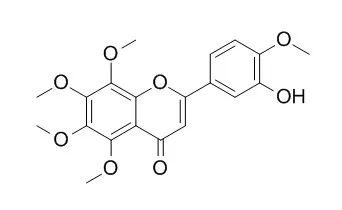Unregulated uptake of oxidized low-density lipoproteins (ox-LDL) via macrophage scavenger receptors (SRs) is a key event in atherosclerosis. We previously reported that nobiletin (NOB), a citrus polymethoxylated flavone, markedly reduced 12-O-tetradecanoylphorbol-13-acetate (TPA)-induced SRs and adhesion molecules mRNA expression and blockade of DiI-acLDL uptake in THP-1 human monocyte-like cells.
METHODS AND RESULTS:
In this study, we examined the effects of NOB metabolites, 3'-hydroxy-5,6,7,8,4'-pentamethoxyflavone (3'-demethyl-NOB,3'-Demethylnobiletin ), 4'-hydroxy-5,6,7,8,3'-pentamethoxyflavone (4'-demethyl-NOB) and 3', 4'-dihydroxy-5,6,7,8,-tetramethoxyflavone (3', 4'-didemethyl-NOB) and NOB analog, tangeretin, on SRs and adhesion molecules mRNA expression. 3'-Demethyl-NOB(3'-Demethylnobiletin ) significantly suppressed CD36 expression, moreover, 4'-demethyl- and 3', 4'-didemethyl-NOB significantly suppressed TPA-induced expression of SR-A and LOX-1. Further, the suppressive effects of 4'-demethyl- and 3', 4'-didemethyl-NOB on the expression of CD36 mRNA were greater extent than parent NOB. The inhibitory effects of the metabolites toward TPA-induced SR mRNA expression are partly associated with the suppression of AP-1 and NF-kappaB transcriptional activities.
CONCLUSIONS:
Together, our results suggest that metabolites of NOB, such as 4'-demethyl- and 3', 4'-didemethyl-NOB, have comparable or higher potentials to attenuate SR expression than NOB. |






 Cell. 2018 Jan 11;172(1-2):249-261.e12. doi: 10.1016/j.cell.2017.12.019.IF=36.216(2019)
Cell. 2018 Jan 11;172(1-2):249-261.e12. doi: 10.1016/j.cell.2017.12.019.IF=36.216(2019) Cell Metab. 2020 Mar 3;31(3):534-548.e5. doi: 10.1016/j.cmet.2020.01.002.IF=22.415(2019)
Cell Metab. 2020 Mar 3;31(3):534-548.e5. doi: 10.1016/j.cmet.2020.01.002.IF=22.415(2019) Mol Cell. 2017 Nov 16;68(4):673-685.e6. doi: 10.1016/j.molcel.2017.10.022.IF=14.548(2019)
Mol Cell. 2017 Nov 16;68(4):673-685.e6. doi: 10.1016/j.molcel.2017.10.022.IF=14.548(2019)